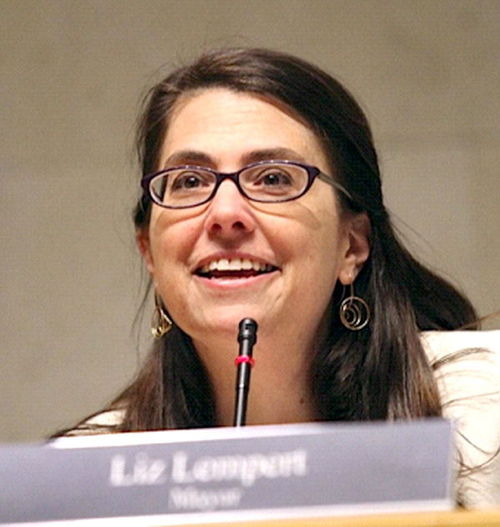Princeton Mayor Liz Lempert said on June 11 that she has not made up her mind whether to participate in upcoming negotiations with Nassau Hall for Princeton University to continue making voluntary financial contributions to the municipality, an issue involving her husband’s employer that she recused herself from five years ago.
“I haven’t decided yet,” Lempert told reporters at a press conference when asked about it in light of a Princeton councilman recently saying the university should give more money to the municipality.
“It means this is one of the most important conversations the town has and I want to try to do what’s in the best interest of the municipality. I feel like there are very capable people on council and I think it’s just something we need to discuss,” she said.
Lempert, whose husband, Ken Norman, is a tenured professor in the university’s Psychology Department, gave no timetable for when she would make her decision, but later said town officials “have a responsibility to the community to act in the best interest of the municipality.”
Through the years, Lempert has taken different positions when it comes to being involved in negotiations with the university. As a member of the Township Committee before the consolidation of Princeton Township and Princeton Borough, she participated in talks for Nassau Hall to contribute monetarily.
In 2013, her first year as mayor of the merged community, Lempert announced she would recuse herself from a group of municipal officials trying to reach a long-term agreement with the university.
Then-municipal attorney Edwin W. Schmierer issued a legal opinion saying Lempert had no conflict of interest, but Lempert faced more scrutiny on the issue, chiefly from then-Councilwoman Jo S. Butler, and said she would remove herself from the issue so as not to be a distraction.
“I made clear in my statement, I think, when I was stepping down that I didn’t feel it was a conflict or an appearance of a conflict,” Lempert said. “But it had become too much about me and I thought that was distracting and not in the best interest of the municipality.”
In 2014, the town and the university reached a deal for Nassau Hall to make escalating financial contributions for seven years, totaling $21.72 million, to its host municipality through 2020. This year, the amount is $3.2 million.
“It is premature to make any comments about what a new agreement might include or what the process might be,” Princeton University spokesman Michael Hotchkiss said on June 12. “We value our positive working relationship with the elected officials and continue to meet the terms of the current voluntary contribution agreement.”
But one Princeton official said he thinks Nassau Hall is “morally obligated to do more.”
Councilman David Cohen sent an email on May 28 to the Princeton University student newspaper, the Daily Princetonian, in which he made the case for greater financial support from the university — remarks that were included in a story the newspaper subsequently published on the subject.
“I feel the best approach to try and convince the administration of the university to do more for the town is to convince the university community, the students, the alumni, the faculty, that they should be doing more,” Cohen said last week. “That’s why I reached out to the Daily Princetonian, because I thought that was the way to reach the students, the alumni and the faculty.”
Council President Jenny Crumiller said on June 11 that talks between the two sides could start in 2019, but she was not certain.
Although he wants to see Nassau Hall give more money to the municipality, Cohen said he did not have a dollar amount in mind.
“The renegotiation won’t happen for a couple of years,” he said. “But in order to try and shift the dialogue with the university community, the conversation has to start now so that, in two years, we will have had a chance to bring people around.”
Cohen’s statement to the student newspaper drew a reaction from other municipal officials, with the Princeton Packet having filed a government records request to see the email exchanges officials had on the topic.
“First of all, nobody told me not to talk to the press,” Cohen said. “They told me they were unhappy I had talked to the press.”
He said he did not feel the pushback he received from other officials “was improper.”
In an e-mail on May 29, Lempert wrote to Cohen telling him, in part, that she was “concerned that the process that you’ve started here, separate from the substance of your arguments, breaks council norms regarding important negotiations. Negotiation strategy has been developed collaboratively in closed session unless for some reason council decides that forming the strategy in public would benefit the municipal position.”
Crumiller said she was not upset Cohen had gone to the student newspaper on his own.
“The thing is negotiations are really sensitive, as you can imagine,” Crumiller said. “Everybody might have different comfort levels with how much you talk about negotiations.”
Crumiller declined to say whether she thought the university should be contributing more money to Princeton than it does already.
“I want to start the negotiations with the university and not in the press,” she said.
“I think there needs to be that discussion of does the discussion happen and the strategy happen, as it has in the past, with developing the negotiating position and strategy in closed session,” Lempert said of a type of government meeting the public is not allowed to attend. “Does it happen in the newspapers? Does it happen in some other forum?”

